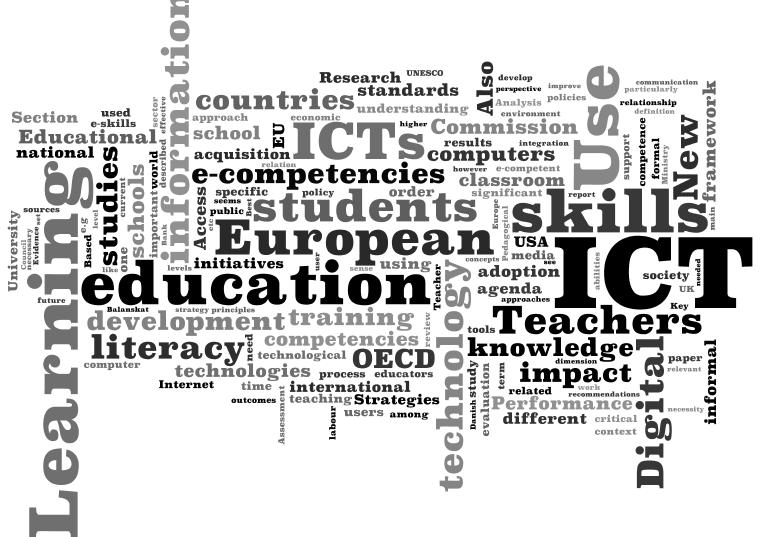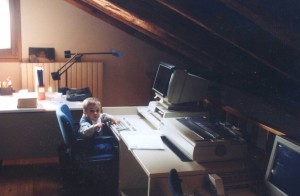Cristobal Cobo, fabricar ciudadanos? , nativo digitale ..., whiteboards interactive? y Paulo Freire [5 enlaces][5 links]
Bueno pues hoy, día de los reyes magos y de los regalos por aquí os traemos cinco regalitos , para nuestra sección [5 enlaces][5 links] ...
 1) De e-rgonomic (de nuestro estimado amigo Cristobal Cobo... ) que nos ha traido hoy el Reporte Final: E-Competencias (U.Oxford) gracias compañero por compartir este estupendo trabajo ... ahhh!!! y las siete claves del estudio ...
1) De e-rgonomic (de nuestro estimado amigo Cristobal Cobo... ) que nos ha traido hoy el Reporte Final: E-Competencias (U.Oxford) gracias compañero por compartir este estupendo trabajo ... ahhh!!! y las siete claves del estudio ...
La imagen resume las 20,00 palabras del estudio
[Descargar Report Final, pdf, 754 Kb]
No se me ocurre una mejor forma de arrancar la nueva década que compartiendo los resultado de esta investigación desarrollada en la Universidad de Oxford. Estudio en el que empecé a trabajar hace un año y medio.
2)
El otro día vi en la 2 de rtve redes, el programa de Punset .... y aunque no me terminó de convencer el documental aquí tenéis un corte del documental sobre el encuentro Educar para fabricar ciudadanos, ... aunque me chirría tremendamente lo de fabricar ciudadanos...y lleva detrás de si una concepción educativa como la de siempre que pretende criticar y poner en crisis... arriba tenéis la primera parte, y abajo la segunda... hay más en you tube. El video comienza con unas palabras de Linda Darlin-Hammond que dicen:
"El antiguo modelo de enseñanza ya no es válido en una sociedad basada en el conocimiento". Sobre eso mucho tendríamos que hablar, esa sociedad basada en el conocimiento es una sociedad realmente altermundialista... o simplemente se da en un pequeño porcentaje de las sociedades ricas, y además dentro de un pequeño porcentaje dentro de esas mismas sociedades... en fin...
3)Come apprende un “nativo” digitale. Una testimonianza from Apprendere (con e senza le tecnologie)
Eugenio “esposto” al PC fin dalla più tenera età
I miei dubbi sull’esistenza dei “nativi digitali” l’ho espressa più volte anche in questo blog giungendo alla conclusione (vedi anche il paper pubblicato nel post precedente) che se proprio vogliamo usare questa espressione, la dobbiamo prendere alla leggera e, in senso lato, per identificare lo studente d’oggi alle prese con la scuola del passato (non possiamo certamente definire” contemporanea” la scuola che questi studenti frequentano). Nulla, quindi, di correlato al “digitale” in senso stretto in quanto questi “nativi” sono portatori di tematiche che hanno radici ben più profonde di quelle del digitale e non sempre correlata alla “questione digitale” che è solo una di quelle tematiche.
Voglio qui portare un’esperienza vissuta su come apprende un ragazzo d’oggi, su come questo affronta “compiti di apprendimento” e sui risultati che ottiene.
4) #Edchat: Do Interactive Whiteboards really promote Interactivity in the classroom?
en education & tech Learning, Knowledge, Tech, Social Media
This is the answer hundreds of teachers wanted to respond in the regular #edchat held all Tuesdays on Twitter. It is true that teachers sometimes are reluctant to change and as Devia Stefaan puts it in this comment, the change needs to come from the inside of teachers and institutions.
Mary Ann Bell agrees the Whiteboard is interactive. (IWB) Users can be contributing directly by input both at the computer and at the board, she writes, to refer just one of her dozen reasons she thinks IWBs are a success. "The interaction that transpires between the person at the computer, the users at the board, and the computer itself is a unique and very adaptable arrangement," Bell concludes...
5)
Rethinking Education as the Practice of Freedom: Paulo Freire and the Promise of Critical Pedagogy en by: Henry A. Giroux, t r u t h o u t | Op-Ed

Paulo Freire and Henry A. Giroux, Amherst, Massachusetts, 1981. (Photo: Henry A. Giroux)
Paulo Freire is one of the most important critical educators of the 20th century.[1] Not only is he considered one of the founders of critical pedagogy, but he also played a crucial role in developing a highly successful literacy campaign in Brazil before the onslaught of the junta in 1964. Once the military took over the government, Freire was imprisoned for a short time for his efforts. He eventually was released and went into exile, primarily in Chile and later in Geneva, Switzerland, for a number of years. Once a semblance of democracy returned to Brazil, he went back to his country in 1980 and played a significant role in shaping its educational policies until his untimely death in 1997. His book, "Pedagogy of the Oppressed," is considered one of the classic texts of critical pedagogy, and has sold over a million copies, influencing generations of teachers and intellectuals both in the United States and abroad. Since the 1980s, there has been no intellectual on the North American educational scene who has matched either his theoretical rigor or his moral courage. Most schools and colleges of education are now dominated by conservative ideologies, hooked on methods, slavishly wedded to instrumentalized accountability measures and run by administrators who lack either a broader vision or critical understanding of education as a force for strengthening the imagination and expanding democratic public life.
Fuente: [varias]
- Bitácora de eraser
- Log in or register to post comments




